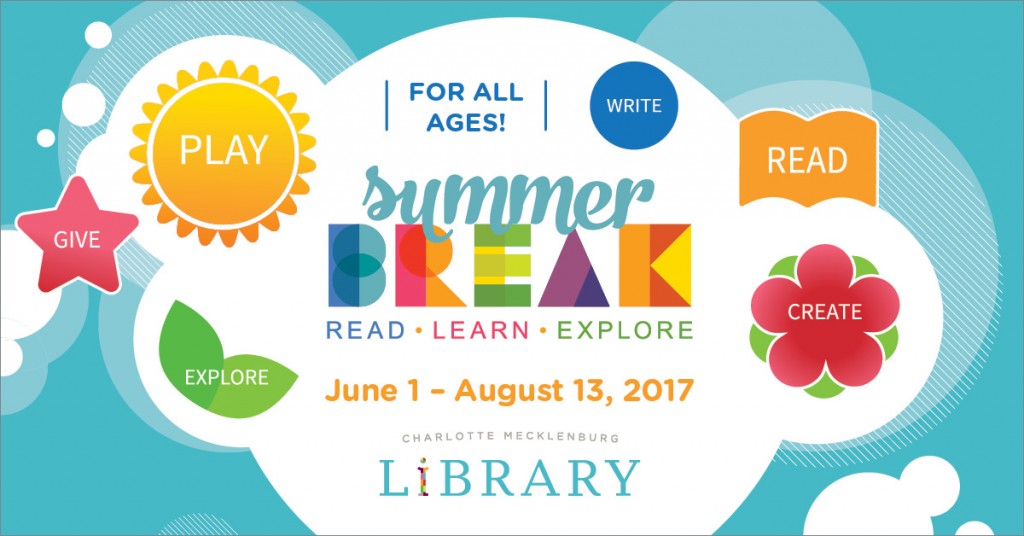By our Smarty friends at the Charlotte Mecklenburg Library
The countdown to the sunny season has begun, and Charlotte Mecklenburg Library is gearing up to offer you Summer Break: Read, Learn, Explore from June 1-August 13.
Here are four reasons to include learning in your summer plans, no matter your age:
1) Have a little one? Summer Break is a fun toolkit to help your tot develop pre-reading skills.
Long before your child enters school, their early literacy skills begin with the primary adults in their life. So let’s start with the youngest summer learners, those ages 0-3. The Library’s Summer Break program for this age is designed to develop pre-reading skills – the skills children need to have so they start Kindergarten ready to learn (if we want to get technical, these include skills like phonological awareness, print motivation, print awareness, vocabulary, narrative skill and letter knowledge).
The activity sheet parents and caregivers receive at sign-up provides suggested activities to do together with a young child. The Library encourages reading together, but also offers tips on how to practice Active Reading with your young child. Just 15 minutes of Active Reading a day, three times a week, can help build a child’s vocabulary, language and comprehension.
2) Help your school-age kids avoid “the summer slide.”
This is, without a doubt, the biggest reason for summer learning. Reading and learning all year round – including the summer months, the most critical time of the academic year because it presents the most risk – can make a difference. Reading just 20 minutes per day has been shown to help fight “the summer slide,” when students without access to summer learning opportunities fall behind their peers, creating an achievement gap that is hard to close.
3) Give your teens a safe place to work on key building blocks of healthy development.
Research shows that there are key building blocks of healthy development – known as Developmental Assets – that help teens grow up healthy, caring and responsible. Summer Break gives young people a safe and fun place to develop some of these assets, including a constructive use of time, commitment to learning (both motivation to do well in the program by reaching achievements, and also learning to read for pleasure), positive values and identity (by taking personal responsibility and seeing that they have control over outcomes), and social competencies like planning and decision-making. The Summer Break program is also a low-risk environment in which teens can learn how to set goals, adjust for hurdles and accomplish them. These are skills that are important to master in preparation for adult life, when decisions have higher stakes.
4) Keep your adult brain active and in tune.
When we think of summer learning, we often think of children, but there are benefits for adults too. Recent studies show that the simple act of getting outside of one’s comfort zone to learn new things and challenge one’s current assumptions, actually helps forge new synapses in the brain. As adults, we have this amazing power to keep our brains in tune, just by diving into something exciting, challenging and new. Programs like Summer Break can be the opportunity and incentive needed to do just that. Read more about these studies on the adult brain here.
Last summer, more than 31,000 people signed up for the Summer Break: Read, Learn, Explore program, reading a total of 16.5 million minutes! We hope you will join us in 2017. Find a kickoff event near you, or register at summerbreak.cmlibrary.org.



